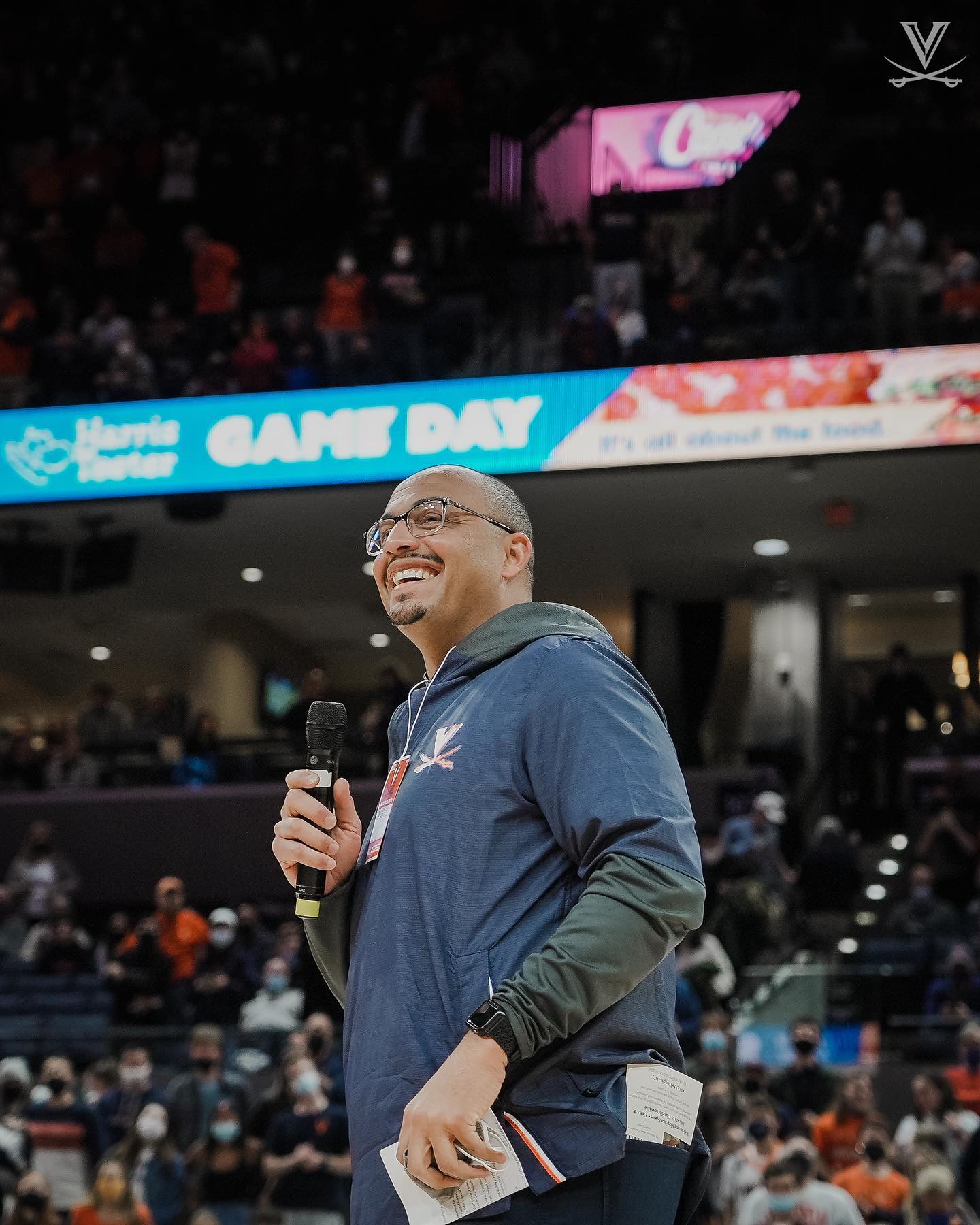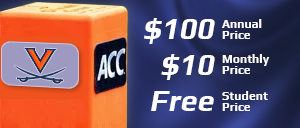
Virginia football coach Tony Elliott said Monday that his first 51 days on the job have been a whirlwind. During that time, he hired his assistant coaches, hit the road recruiting to meet high school coaches and prospects in the state and beyond, began the process of blending new faces with the retained support staff, and much more. Sitting in the head coaches’ chair for the first time, Elliott found out quickly just how much flies at you at the top.
“The transition created these bags under my eyes,” Elliott said with a laugh. “I had long days as an assistant, but as a head coach it’s long days and it’s actually a lot more intense. I know that might sound strange, but every minute of the day you’re being pulled in a thousand different directions. So really it’s the ability to capture your thoughts and maintain your thought while you’re entertaining another thought in another conversation. That’s been the biggest adjustment for me is being able to say I’m thinking about this, but then somebody needs this, I’ve got to be able to hold on to this thought and then be fully present right here. And then it just keeps going and by the end of the day you’ve had numerous situations like that. You’re in the bed at night still thinking about everything that’s going on. So it’s a good problem, but it’s just a lot. There’s so many things until I’m able to process it all, figure it out, and then delegate.”
Perhaps the biggest task during this transition phase proved to be the process of hiring a staff. Elliott took his time to evaluate the coaches he would surround himself with for his first head coaching job. Up front, he identified some of the things he wanted from those positions. As he said at his introductory press conference in December, that started with what type of character those coaches had but the other criteria focused on their ability to teach and develop players plus their ability to recruit future players.
Elliott expanded on those thoughts in a video call with the media Monday. In taking over the Virginia program, he identified certain things related to the program and school. First, there’s the academic profile. That influences the types of recruits that can be targeted. Second, there’s also the trend in recent years of in-state talent leaving Virginia to play in other areas. Finally, there’s the program’s recent history. Elliott credited Mendenhall for rebuilding the foundation of the program from what he inherited, but also noted the growth still needed. The Cavaliers finished 22-27 in the ACC during Mendenhall’s tenure, which included a 14-11 mark over the final three seasons. Mendenhall posted four consecutive seasons with at least four ACC wins for the first time since George Welsh from 1997-2000, but also finished with just two winning records in six seasons and .500 overall in his final two seasons.
The Hoos have a single bowl win over the past 16 years. They have a single win against Virginia Tech over the past 18 years. Simply put, that means anyone in the recruiting age range has not seen UVA win in some of its most visible games.
In a nutshell, there are still challenges to build Virginia football into a consistent winner and contender. Elliott said he recognized the varying challenges and wanted a staff that could lean into the grind ahead. At first that could mean “doing more with less” as coaches.
“I think a lot of it also stems just from my path to get to where I am, starting at South Carolina State then at Furman,” Elliott said. “When you start as an FCS guy, you do it all. You have to do everything. You’re the coach, you’re the counselor, you’re the academic liaison, the housing liaison, financial aid liaison. You paint the fields. You wash the clothes. You do a little bit of everything. So that mindset is where it starts because I wanted to have people that were like-minded, that were self-motivated. Obviously is doesn’t matter the talent level, you still have to figure out how to get the most out of each and every player. That’s the mindset I want to create in this football team, that we’ve got a little bit of a chip on our shoulder. We don’t mind being the underdog, we’re going to scrap and fight. … In the meantime, I need coaches that want to get in there and grind and are truly excited about building something. I think that was important too looking at a staff, that they really, really shared the vision and were excited to get in and let’s just go grind and build this thing from where Bronco left it to where we believe it can go.”
Ultimately, Elliott settled on coaches that have mixed levels of experience, mixed ties to the school and region, and mixed familiarity with he himself.
For the offensive and defensive coordinators, the choices share some things in common – like experience – but not others – like knowing Elliott. Offensive coordinator Des Kitchings coached in the ACC previously and has known Elliott for years. The two had discussed possibly working together if the right situation ever arrived. He left the NFL’s Atlanta Falcons to join the staff. Defensive coordinator John Rudzinski brings experience to the table too after working for 14 years at Air Force, including four in the same DC role, but Elliott did not know him prior to the interview process.
Both coordinators have some shared traits with other staff members too. Kevin Downing (defensive tackles) and Keith Gaither (running backs) both worked at service academies as well. Both knew Elliott previously. Clint Sintim (linebackers) and Marques Hagans (receivers), both retained from the previous staff, played at UVA as did incoming coach Chris Slade (defensive ends). Elliott did know Slade previously after recruiting prospects at Pace Academy when Slade was the head coach there as did Taylor Lamb (quarterbacks), whose father hired Elliott at Furman near the start of his own coaching career. Curome Cox (defensive backs) did not know Elliott previously, but was interviewed from the recommendation of Rudzinski after working with him at Air Force. Garett Tujague (offensive line) was retained from the previous staff and Elliott said Cavalier players spoke highly in favor of him as part of that choice.
The group now sets out on forming what the next phase will look like as Elliott provides the vision of what he calls “the model program” in college football.
“When I say model program, I want the program to be a win-win for everybody,” Elliott said. “I don’t want it to be a win just for the University of Virginia or I don’t just want it to be a win for the student-athlete. Let’s go and win this thing together meaning that when you leave my care, I want you to walk away with what matters most. That’s your degree, transferable life skills, a great appreciation for your college experience, and then having a chance to win a championship. Also with the model program, showing that you can still compete and have success at the highest level but not have to compromise the things that are truly important, which is academics first and foremost. … At the end of the day, it’s about education. It’s about educating these young men and preparing them for life after football, but you can do that and still win at the highest level.”



